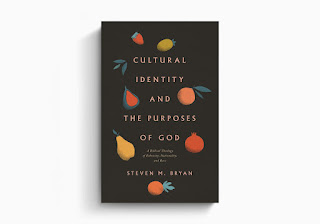"Cultural Identity and the Purposes of God" by Steven M. Bryan. A Review
Most people seem to assume that they know the answer to the
question, “What are nations for?” and a similar query, “What are cultures for?”
An American might well answer that it is to secure life, liberty, and the
pursuit of happiness, or something along those lines. But as Christians who are
drawn into the Kingdom of God by the grace of God, the answer goes deeper.
Steven M. Bryan, professor of New Testament at Trinity Evangelical Divinity
School in Deerfield Illinois, has poured himself into a fuller answer to those
two questions in his recently published, 288-page softback, “Cultural Identity and the Purposes of God: A Biblical Theology of Ethnicity, Nationality, and Race”. The aim of this volume “is to explore what Scripture has to say about
God’s purposes not only for people but also for peoples.” This includes “individuals
in families and families within peoples.” The reason for his focus is that “the
relationship between peoples turns out to be a crucial, if often overlooked,
feature of the biblical story” (14-5). Though it is an academic work, it is
comprehensible by anyone who desires to delve into this important subject.
One of the beauties of the volume is how rich it is in
biblical theology. Bryan takes God’s story, from Genesis to Revelation, and
shows how the episodes of God’s story stand together, and many times stand
inside each other, as he answers the two major questions of what nations and
cultures are for. Readers will be gently schooled on seeing the bigger picture
as they work through biblical details. I really appreciated his observations on
the connections in the genealogy of Jesus in Matthew 1 between the construction
of Israel, its deconstruction, and its reconstruction in Jesus. I also was
delighted with his handling of the “devoted to destruction” theme in Joshua,
especially how he masterfully shows that this is not about genocide but the
destruction of national identities that were rooted in the worship of false
gods. This was the very same outcome that happened to rebellious Israel
(Chapter 5).
One of Bryan’s concerns is how many followers of Jesus “have
found themselves implicated in a global resurgence of ethnonationalism – the belief
that a nation should be culturally singular” (14). As he explains later,
national populists “fuel a sense of group grievance with a belief that their
racial, ethnic, or national identities were once rightfully dominant but
are now threatened. In one sense, the nationalist form of identity politics
poses the greater threat to a Christian way of thinking about the world because
it not only embraces the notion that cultural groups are power identities but
celebrates and pursues the dominance of one group over another” (100). He works
hard to give a better, truly biblical remedy to such an ailing perspective.
And one of the author’s main conclusions is that “the
biblical vision of unity requires diversity” (82). This pushes against
the forces that want national and cultural uniformity, on the one hand, or that
elevate cultural and national divergence on the other. By his own estimation,
the most significant conclusion of the study “is that God’s purposes for
humanity are realized in the formation of a people of peoples through the
restoration of individuals to right relationship with himself and others”
(252). God’s purpose for nations and cultures is not to eviscerate cultural
particularity by squishing them into a one-size-fits-all mold, but “the
cultural particularity of each people becomes what God intended as it takes its
place within the whole – part of a community of blessing” (253).
What Bryan works out in this book was done in his engagement
within the context of the multi-tribal country of Ethiopia over many years. And
that backdrop adds a sense of weightiness to the whole work. And much of his
reasoning is very helpful in an American context with the rise of Christian
Nationalism, Critical Race Theory, Wokism, racism and jingoism. It is a
biblically healthy response to each in ways that can open up the horizon and
map out a path forward for God’s people.
“Cultural Identity and the Purposes of God” is a volume worth taking up and working through. Pastors, missionaries, seminarians, and those engaged in multiethnic mercy ministries should grab a copy. Libraries at Christian Colleges and Seminaries need to do so as well. I highly recommend the book.
My thanks to the author’s parents who gave me a copy as a gift.




Comments